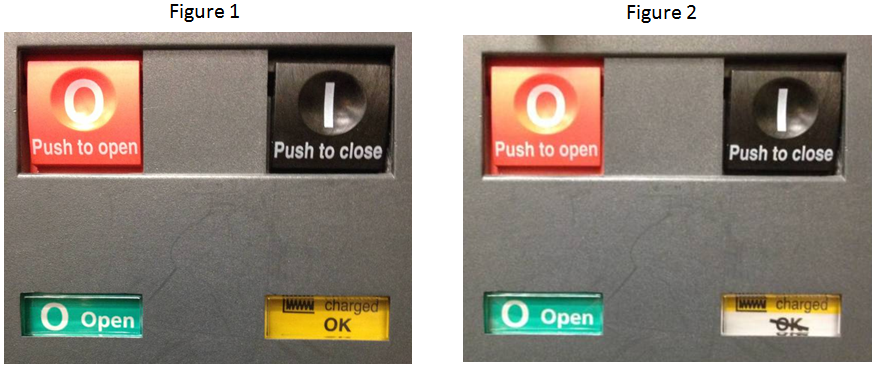Search FAQs
Video: How does the padlock attachment keep a Masterpact NW circuit breaker locked in the OPEN position?
Product Line:
Masterpact NW Circuit Breakers
Resolution:
In simple terms, when an NW breaker is padlocked in the OPEN position, the breaker is physically kept from being closed. It is held in the OPEN position, almost as if someone were standing in front of the breaker continually pressing the OPEN button. For more details, including a 50 second video demonstrating this point, continue reading.
On the front face of an NW breaker, just below the OPEN and CLOSE buttons, are two small clear windows. Behind those windows are flags that change state depending on the status of the breaker. The left hand flag shows only one message: the status of the breaker contacts (open or closed). The right hand flag shows two messages: the status of the charging spring (discharged or charged), and whether or not there is anything that will physically interfere with successfully closing the breaker (OK orOK).
Compare the right hand flag in figures 1 versus figure 2.
The flag in figure 1 shows "charged OK" (all in yellow), meaning the spring is charged, and there is nothing to physically interfere with the breaker being closed.
The flag in figure 2 shows "chargedOK" (yellow and white), meaning the spring is charged, but there is something that will physically interfere with the closing of the breaker.

When an NW breaker has a padlock attachment, before the padlock is installed, there is nothing to interfere with closing the breaker, and the flags will appear as in figure 1. But once a padlock is installed, it causes physical interference within the breaker of the closing process, locking the breaker in the OPEN position, and the flags will now appear as in figure 2. When the padlock is later removed, the flags immediately change back to figure 1, indicating the breaker can now be closed.
For a 50 second video demonstration of this, watch the video below (no sound).
Masterpact NW Circuit Breakers
Resolution:
In simple terms, when an NW breaker is padlocked in the OPEN position, the breaker is physically kept from being closed. It is held in the OPEN position, almost as if someone were standing in front of the breaker continually pressing the OPEN button. For more details, including a 50 second video demonstrating this point, continue reading.
On the front face of an NW breaker, just below the OPEN and CLOSE buttons, are two small clear windows. Behind those windows are flags that change state depending on the status of the breaker. The left hand flag shows only one message: the status of the breaker contacts (open or closed). The right hand flag shows two messages: the status of the charging spring (discharged or charged), and whether or not there is anything that will physically interfere with successfully closing the breaker (OK or
Compare the right hand flag in figures 1 versus figure 2.
The flag in figure 1 shows "charged OK" (all in yellow), meaning the spring is charged, and there is nothing to physically interfere with the breaker being closed.
The flag in figure 2 shows "charged
When an NW breaker has a padlock attachment, before the padlock is installed, there is nothing to interfere with closing the breaker, and the flags will appear as in figure 1. But once a padlock is installed, it causes physical interference within the breaker of the closing process, locking the breaker in the OPEN position, and the flags will now appear as in figure 2. When the padlock is later removed, the flags immediately change back to figure 1, indicating the breaker can now be closed.
For a 50 second video demonstration of this, watch the video below (no sound).
Released for:Schneider Electric New Zealand
Explore more
Range:




Explore more
Range:





